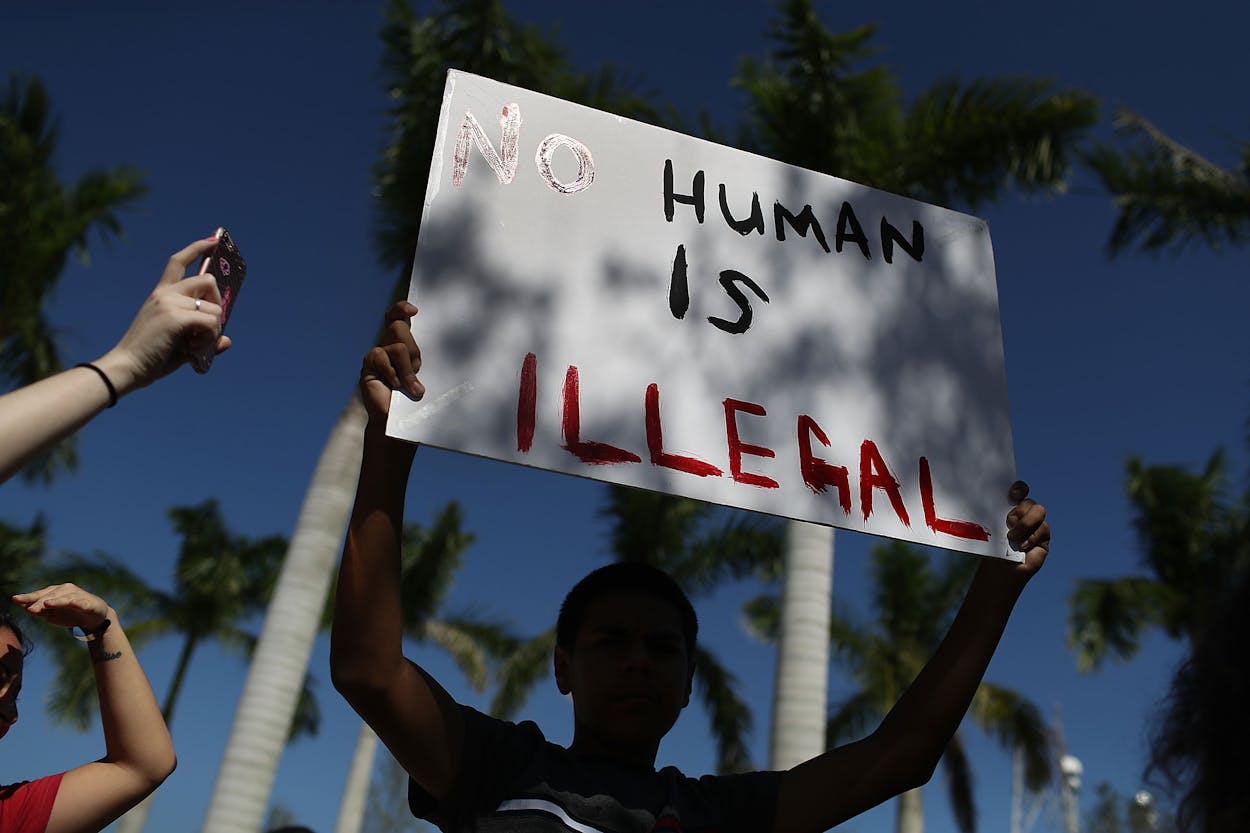In light of President-elect Donald Trump’s threats to roundup and deport millions of undocumented immigrants, the “sanctuary campus” movement has spread to nearly every major college in the state of Texas. A petition circulating at the University of Texas at Austin asking President Greg Fenves to explore the possibility of making UT a “sanctuary for students, staff, and their family members who face imminent deportation” has garnered nearly 8,000 signatures. More than 1,000 students, faculty, and alumni signed a similar petition at Texas State University. Faculty members at Texas A&M recently met with university officials to discuss making the College Station campus safe from federal immigration enforcement, and separate sanctuary petitions made the rounds at the university’s satellite campuses in Corpus Christi and Kingsville. Last week, students at the University of North Texas and Texas Women’s University staged a walkout and marched through Denton to show solidarity with the sanctuary campus movement.
Trump placed the potential number of deportations at anywhere from three million to eleven million throughout his campaign, so undocumented students and their supporters are understandably worried. But what can college campuses actually do to protect students and faculty from Trump and U.S. Immigration and Customs Enforcement?
As of yet, no Texas college has publicly come out and declared itself a sanctuary campus. But a handful of schools across the country have already done so, providing a possible blueprint for Lone Star schools who may choose to follow suit. The University of Pennsylvania (which, coincidentally, is Trump’s alma mater) and Columbia University both recently announced that they will become sanctuary campuses. “The University of Pennsylvania will not allow Immigration and Customs Enforcement (ICE) / Customs and Border Protection (CBP) / U.S. Citizenship and Immigration Services (USCIS) on our campus unless required by warrant,” Penn President Amy Gutmann wrote in an email to students last week, according to the Philadelphia Inquirer. “Further, the university will not share any information about any undocumented student with these agencies unless presented with valid legal process.”
Columbia made a similar promise to not cooperate with federal immigration authorities unless ordered to do so by court, and in the event Trump repeals President Barack Obama’s Deferred Action for Childhood Arrivals policy, the university said it will “expand the financial aid and other support” for undocumented students as a countermove, according to the Columbia Spectator. New York University and Wesleyan University also pledged to become sanctuary campuses. In reality, these declarations don’t change much at either of the New York City universities or at Penn, which is in Philadelphia, because both of those cities are already designated “sanctuary cities,” so local law enforcement agencies there are already committed to having limited cooperation with federal immigration agencies.
It’s unclear what might happen should a university’s sanctuary status be challenged. Princeton University President Christopher Eisgruber recently said in a statement that he had consulted with immigration lawyers and determined that the concept of sanctuary campuses “has no basis in law, and that colleges and universities have no authority to exempt any part of their campuses from the nation’s immigration laws.” And New Mexico State University’s president rejected a sanctuary campus petition from students and faculty out of fears the school might lose federal funding and would no longer be allowed to issue visas to international students or visiting faculty, President Garrey Carruthers wrote in a memo.
In Texas, Governor Greg Abbott was quick to threaten any potential sanctuary campuses. On the same day students at North Texas and Texas Women’s University staged their walkout, Abbott tweeted:
Texas will not tolerate sanctuary campuses or cities. I will cut funding for any state campus if it establishes sanctuary status. #tcot https://t.co/2wN4eo1YLG
— Greg Abbott (@GregAbbott_TX) December 1, 2016
Abbott has yet to explain how, exactly, he would go about slashing funds for sanctuary campuses, but his threat seems to hold no water, since he can’t act alone to cut state funding for Texas colleges and universities anyway. “Whatever money is going to these schools is worked through by the House, Senate and the governor’s office,” State Representative Trey Martinez-Fisher, a Democrat from San Antonio, told the Huffington Post last week. “If the governor is going to follow through with his threat to veto funding to universities, he will have only done so with the acquiescence of the House and the Senate, and I doubt that would ever happen.”
Of course, Abbott has long been an opponent of sanctuary cities. But he has yet to successfully pass any bill banning sanctuary cities through the state Lege, so there’s no reason to think he’d be able to pass similar legislation punishing sanctuary campuses anytime soon.






